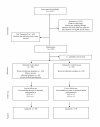Long-term outcome of a randomized controlled universal prevention trial through a positive parenting program: is it worth the effort?
- PMID: 20470435
- PMCID: PMC2893447
- DOI: 10.1186/1753-2000-4-14
Long-term outcome of a randomized controlled universal prevention trial through a positive parenting program: is it worth the effort?
Abstract
Background: Approximately 20% of children experience internalizing or externalizing DSM-IV-TR disorders. This prevalence rate cannot be reduced through treatment only. Effective preventive interventions are therefore urgently needed. The aim of the current investigation is to evaluate the two-year efficacy of the group Triple P parenting program administered universally for the prevention of child behavior problems.
Methods: Based on their respective preschool, N = 280 families were randomly assigned either to the parent training or to the control group. The efficacy was analyzed using multi-source assessments, including questionnaires by mother and father, behavioral observation of mother-child interaction, and teacher evaluations.
Results: At the 2-year follow-up, both parents in the Triple P intervention reported significant reductions in dysfunctional parenting behavior, and mothers also an increase in positive parenting behavior. In addition, mothers reported significant reductions in internalizing and externalizing child behavior. Single-parent mothers in the Triple P intervention did not report significant changes in parenting or child problem behavior which is primarily due to inexplicable high positive effects in single parent mothers of the control group. Neither mother-child interactions nor teacher ratings yielded significant results.
Conclusions: The results support the long-term efficacy of the Triple P - group program as a universal prevention intervention for changing parenting behavior in two-parent households, but not necessarily in single-parent mothers.
Figures
References
-
- Frick PJ, Lonely BR. In: Handbook of disruptive behavior disorders. Quay HC, Hogan AE, editor. New York, Kluwer Academic/Plenum; 1999. Outcomes of children and adolescents with oppositional defiant disorder and conduct disorder; pp. 507–524.
-
- Hiscock H, Bayer JK, Price A, Ukoumunne OC, Rogers S, Wake M. Universal parenting programme to prevent early childhood behavioural problems: Cluster randomized trial. British Medical Journal. 2008;336:318–321. doi: 10.1136/bmj.39451.609676.AE. - DOI - PMC - PubMed
-
- Murray JL, Lopez AD. The global burden of disease. Boston: World Health Organization; 1997.
LinkOut - more resources
Full Text Sources


